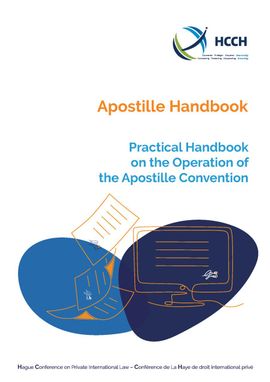The Convention of 5 October 1961 Abolishing the Requirement of Legalisation for Foreign Public Documents (HCCH 1961 Apostille Convention) facilitates the use of public documents abroad. The purpose of the Convention is to abolish the traditional requirement of legalisation, replacing the often long and costly legalisation process with the issuance of a single Apostille certificate by a Competent Authority in the place where the document originates. The electronic Apostille Programme (e-APP) was launched in 2006 to support the electronic issuance and verification of Apostilles around the world.
The Convention has over 125 Contracting Parties, and has become one of the most widely applied multilateral treaties in the area of legal cooperation, with several million Apostilles issued each year.
Important Information on electronic Apostilles (e-Apostilles)
- An e-Apostille is an official Apostille issued in digital form. It is created and signed electronically and linked to a secure digital certificate.
- An e-Apostille cannot be refused simply because it is issued in electronic form.
- The same rules and procedures apply when issuing an e-Apostille as when issuing a paper Apostille. As a result, an e-Apostille is just as valid as a paper Apostille and must be accepted by all Contracting Parties to the Apostille Convention.
- An e-Apostille offers faster processing, enhanced security, and greater convenience for users and authorities.
Please note that the Permanent Bureau of the HCCH has no mandate to issue or verify Apostille Certificates. Apostille Certificates can only be issued and verified by designated Competent Authorities of Contracting Parties to the 1961 Apostille Convention. A full list of Contracting Parties and the contact details of their Competent Authorities can be found here. For individuals seeking further information regarding Apostille Certificates, please contact the relevant Competent Authority.
Model Apostille Certificate:
Explanatory documents:
- Outline of the Convention
- Apostille Handbook
- Background Note on Art. 1(3) exclusions
- The ABCs of Apostilles
- Brief Implementation Guide
- Explanatory Report 1960
- La légalisation des actes officiels étrangers by Georges A.L. Droz (Prel. Doc. No 1 of March 1959)
e-APP (electronic Apostille Programme):
- e-APP Background Note
- e-APP Principles and Practices
- Explanatory documents
- Implementation Chart (e-Apostilles and e-Registers)
- List of e-Registers
- e-APP Notifications
- 14th International Forum on the e-APP (2026)
- Previous e-APP Meetings

